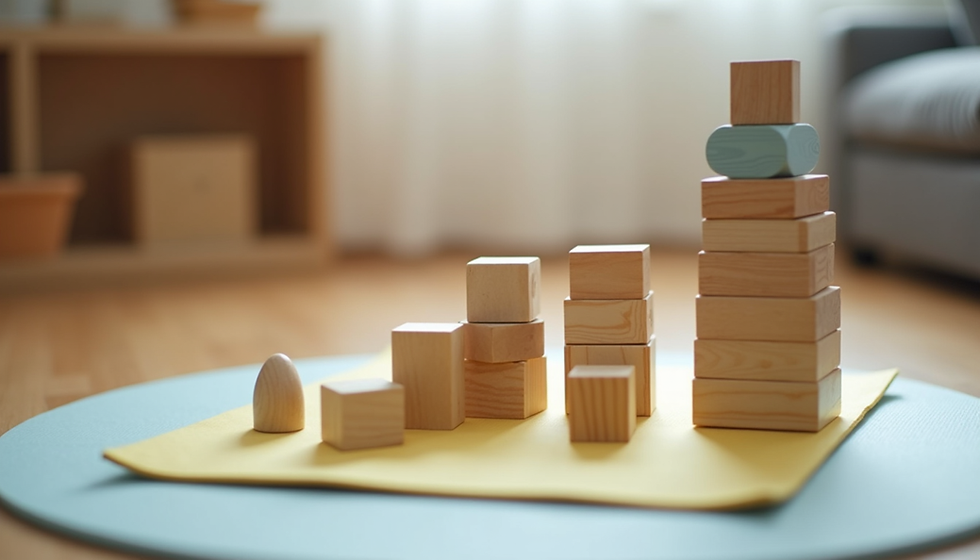The Benefits of Montessori Toys for Early Childhood Development
- G MANASA
- Jul 15, 2025
- 4 min read
Montessori toys are specially designed materials that promote learning through play, emphasizing freedom and creativity in young children. These tools are not just fun; they're essential for fostering development during crucial early years. In this post, we'll explore the benefits of Montessori toys, how they aid in various areas of childhood development, why they may be pricier than standard toys, and tips for integrating them into your child's playtime.
Understanding Montessori Toys
Montessori toys are designed based on the educational philosophy established by Dr. Maria Montessori, an Italian physician and educator. Unlike conventional toys that often focus on entertainment, Montessori toys provide children with opportunities to engage in purposeful activities that enhance their cognitive and physical skills.
These toys are generally made from natural materials, providing a sensory experience that plastic toys cannot match. For instance, a soft wooden puzzle is not just visually appealing but also allows children to explore textures and sounds. They encourage hands-on learning and can adapt to the evolving abilities of children as they grow.

The Role of Montessori Toys in Early Childhood Development
Research shows that active play is fundamental for a child’s development and well-being. Montessori toys support several crucial developmental areas:
1. Cognitive Development
Montessori toys often encourage problem-solving and critical thinking. For example, toys like stacking rings or shape sorters help children understand spatial awareness, cause and effect, and basic geometry. These activities sharp their mental agility, allowing them to learn concepts such as sizes, colors, and patterns while having fun.
2. Fine Motor Skills
Many Montessori toys require children to grasp, balance, and manipulate small objects. Activities like threading beads on strings or matching shapes enhance dexterity and hand-eye coordination. This development is essential for tasks like writing, buttoning clothes, and many everyday functions.
3. Encouraging Independence
Montessori philosophy emphasizes self-directed activity. Toys that allow children to play on their own foster independence and confidence. When children make choices about how to play, they develop a sense of control and responsibility. This autonomy is fundamental in helping them become resilient individuals.

4. Social Skills
Playing with Montessori toys can also promote social interaction. While some toys are meant for solitary play, many are designed for group play, encouraging teamwork, empathy, and communication. Toys like building blocks allow for collaborative projects, teaching children to negotiate and share.
5. Emotional Development
Montessori toys often invite introspection and self-awareness, aiding emotional development. Role-playing with toys, such as dolls or figurines, allows children to express feelings and explore various scenarios. This form of imaginative play is instrumental in developing emotional intelligence.
Why are Montessori Toys so Expensive?
One common belief regarding Montessori toys is their higher price compared to standard toys. The reasons for this can be attributed to several factors:
Quality Materials: Montessori toys are often crafted from high-quality, sustainable materials such as wood, which can be more expensive than plastic. Unlike mass-produced items, these toys are made to last.
Educational Design: Each toy is scientifically designed to serve a specific educational purpose. Creating such thoughtfully designed products involves extensive research and careful development, contributing to their cost.
Ethical Production: Many Montessori toy companies prioritize ethical production, ensuring fair wages and safe working conditions. This practice can result in higher prices but supports responsible business practices.
Longevity: Montessori toys are designed to grow with children, which means they can be used for several years and often serve multiple age groups. Investing in a few quality toys can be more economical in the long run than frequently replacing cheaper toys.

Practical Tips for Integrating Montessori Toys at Home
To maximize the benefits of Montessori toys in your child’s daily routine, here are some actionable recommendations:
1. Choose Age-Appropriate Toys
Select toys that match your child’s developmental stage. Toys that are too advanced can lead to frustration, while toys that are too simple can cause boredom.
2. Create a Learning Environment
Set up a designated area for play that encourages exploration and creativity. Keep it tidy and equipped with various educational materials to appeal to different interests and stages of development.
3. Engage in Play Together
Participate in your child's playtime. Ask open-ended questions and encourage them to explain their thought processes. This engagement not only nurtures their social skills but also strengthens your bond.
4. Rotate Toys Regularly
Avoid overwhelming your child with too many options. Rotate toys every few weeks to keep their interest piqued and stimulate their imagination. This practice also allows them to dive deeper into learning with fewer distractions.
Embracing Montessori Toys for Lifelong Skills
Choosing to incorporate Montessori toys into your child's life is an investment in their future. These tools not only foster academic skills but also essential life skills like perseverance, creativity, and independence. As children play, they are laying the groundwork for a lifelong love of learning—an invaluable skill in our ever-changing world.
As parents and caregivers, providing children with quality materials that enhance their early development is one of the best gifts you can give them. Consider exploring options for the best montessori educational toy and enriching your child’s playtime with meaningful learning experiences. By making thoughtful choices, you can support your child in becoming a confident and capable learner, well-prepared for the challenges ahead.

By focusing on quality Montessori toys, you're not just providing objects for play—you're investing in a foundation for your child's future development. The rewards speak volumes as your child thrives emotionally, socially, cognitively, and physically. Choose wisely, and watch as they flourish through the power of play!



Comments